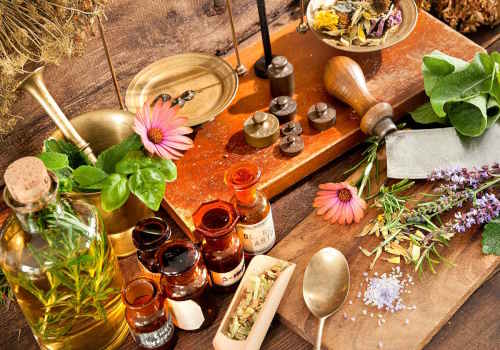Many herbal remedies could have anti-inflammatory properties. Yet, the evidence to support natural inflammation remedies is lacking. Inflammation is the body’s primary defense mechanism against infections, wounds, and other forms of harm.
We know that inflammation is at the root of most diseases, and the average American adult is dealing with some sort of systemic inflammation issue. It’s a common denominator that can be addressed naturally and, really, quite easily with dietary and lifestyle changes — like adding more anti-inflammatory herbs to your diet.
However, inflammation itself can be harmful in some cases. For example, many conditions can cause inflammation to remain elevated, resulting in tissue damage.
A range of anti-inflammatory drugs exist to help control inflammation in the body. However, they often have side effects and may not always be effective.
The inflammation issue is very much due to the modern American diet that’s loaded with foods that cause inflammation.
Consuming anti-inflammatory herbs is one of the best ways to keep inflammation at bay and alleviate a slew of symptoms connected to this health issue. Adding anti-inflammatory foods and herbs to your daily wellness regimen can make a huge difference in the way you feel.
Here are 20 of the best anti-inflammatory herbs to use:
1. Ashwagandha
Ashwagandha is a well-known anti-inflammatory herb that is able to help reduce cortisol in the body and fight the negative effects of stress. By reducing inflammation, ashwagandha helps balance blood sugar levels, ease anxiety, relieve adrenal fatigue and boost immune function.
Research also shows that the herb may help protect against skin inflammation.
You’ll find ashwagandha in herbal supplements, teas and more. It’s becoming quite popular for its ability to combat stress and anxiety, and it’s also found in formulas made for promoting restful sleep.
2. Astragalus Root
Astragalus is a plant in the legume family that has roots in traditional Chinese medicine. It has been used for thousands of years to help the body fight off stress, and lab studies on cells indicate that its extracts are able to reduce inflammation and oxidative stress.
The herb has saponins, flavonoids and polysaccharides that are responsible for its anti-inflammatory effects.
You can find astragalus root in tincture, capsule and tea forms. It’s also used in skin care products for its ability to minimize scarring and promote wound healing.
3. Calendula
Calendula is one of the best anti-inflammatory herbs that has been used to make tinctures, compresses, teas and creams. It’s commonly taken orally or applied topically to reduce inflammation and provide powerful antioxidants.
The anti-inflammatory benefits of calendula come from the linoleic acid content, which has proved to be a potent remedy for issues like dermatitis, ulcers, sore throat and diaper rash. Calendula is also used for fighting infections and promoting oral health.
4. Cat’s Claw
Cat’s claw is known as a powerful antiviral herb from the Amazon, but it also has impressive anti-inflammatory properties. It’s known for its ability to improve inflammatory digestive problems, like Crohn’s Disease, stomach ulcers and leaky gut syndrome.
Traditionally, cat’s claw was consumed in tea form, but today you can also find it in liquid extract and capsules. It’s available in topicals as well, which are used to relieve issues like muscle and joint pain.
5. Chamomile
Chamomile is another therapeutic plant that’s been used for centuries for its healing, nourishing properties. In the early settlements of America, doctors used chamomile to reduce pain and inflammation and relieve digestive issues.
Studies suggest that because of chamomile’s anti-inflammatory properties, it is beneficial for issues like osteoarthritis, gastrointestinal disorders and ulcerative colitis.
6. Cilantro
This versatile herb that you may use for flavor is actually packed with antioxidants, including the flavonoid quercetin. It helps settle digestive complaints, fight oxidative stress, and promote detoxification of heavy metals and toxins.
The seeds of the cilantro plant, called coriander, possess anti-inflammatory properties that may play a role in disease and even cancer. Both cilantro and coriander can be used in recipes and are ingredients in many herbal supplements.
7. Echinacea
Echinacea is an herb that’s valued for its chemical constituents, including flavonoids, inulin, polysaccharides and essential oils. The herb is commonly used to fight infections, boost immune system function and reduce pain.
Research highlights that echinacea can effectively reverse and alleviate various types of inflammation, including issues like rheumatoid arthritis.
8. Fenugreek
Fenugreek is one of the best anti-inflammatory herbs because of its many benefits for digestive health and cardiovascular health. It can reduce inflammation of the stomach and has been shown to improve inflammatory issues, like mouth ulcers, bronchitis, chronic coughs and metabolic disorders.
You can easily find fenugreek supplements in tincture, capsule and powdered forms. Fenugreek tea is also available, and topicals are used on the skin and hair.
9. Holy Basil
Holy basil is an adaptogenic herb and one of the top herbs for healing. It is able to fight viral, bacterial and fungal infections.
Holy basil helps relieve headaches and sinus pressure, supports dental health, and protects the health of your heart.
There are many human studies attesting to holy basil’s, or tulsi’s, multiple therapeutic actions, including its anti-inflammatory and immunomodulatory effects.
10. Kava Kava
Kava kava is an herbal plant that’s commonly used for its sedative, calming effects. Extracts from kava root have anti-inflammatory properties that help promote immune system function.
Research suggests that kava is able to improve inflammatory conditions, like rheumatoid arthritis, because of its impressive compounds.
11. Lemon Balm
Lemon balm is an herb in the mint family that works as a powerful antioxidant and anti-inflammatory agent.
It can help reduce chronic inflammation and protect against disease, while relieving pain. It also works to soothe digestive problems and headaches.
Lemon balm can be added to foods, taken in supplement form and consumed as a tea. These days, it’s found in many formulas meant to ease anxiety and the effects of chronic stress.
12. Licorice Root
Licorice root is another adaptogenic herb that has been used for its anti-inflammatory properties for centuries. It’s often used for gastrointestinal issues, coughs and colds, and heartburn.
Studies indicate that its anti-inflammation potential comes from the flavonoid content, in addition to its coumarins and stilbenoids.
13. Oregano
Oregano is an herb that’s in the mint family. It has been considered a precious plant for over 2,500 years in folk medicines.
The list of oregano benefits is long and includes its ability to treat respiratory issues, ease indigestion and fight infections.
Essential oils of oregano have the ability to benefit chronic inflammation, arthritis, atherosclerosis and diabetes.
14. Parsley
Parsley isn’t just a garnish — it’s an herb with impressive active compounds, including phenolic compounds, antioxidant flavonoids, carotenoids and ascorbic acid.
Research indicates that the herb works to promote health by preventing oxidative stress-related diseases, and it has a history of being used for reducing inflammation in folk medicine.
15. Passion Flower
Passion flower is a plant that’s used in herbal infusions, teas and supplements. The phytonutrient and antioxidant content in passion flower is able to attenuate inflammation and decrease fluid buildup, which has been shown in animal studies on using the herb for swelling.
Along with its anti-inflammatory effects, passion flower is also used to reduce anxiety and even lower blood pressure.
16. Rhodiola
Rhodiola is a natural anti-inflammatory herb that helps increase energy and athletic performance, reduce cortisol levels, and improve brain function. Research proposes that its anti-inflammatory effects allow the herb to aid rapid muscle recovery and improve endurance.
Rhodiola is gaining popularity and can be found in capsule or tablet form, usually combined with other energy-boosting herbs.
17. Rosemary
Rosemary is a plant that belongs to the mint family. It’s commonly used in cooking, but its essential oils are also used therapeutically for their ability to reduce inflammation.
The herb can help boost memory and focus and can be used topically to relieve pain and stimulate hair growth.
Research shows that rosemary extract can even help attenuate brain inflammation and boost cognitive health with its antioxidant compounds.
18. Sage
The sage (or Salvia) plant species has been used in traditional medicine for centuries. It has been shown to protect the body against oxidative stress and free radical damage, fight bacterial and viral infections, and reduce inflammation.
You can find sage in many forms, including capsules, teas and essential oils.
19. Spearmint
Spearmint is a natural anti-inflammatory herb that’s commonly used in cooking, cleaning and more.
Studies show that it has protective effects against inflammatory conditions. It’s used to fight bacteria and fungal infections, ease digestive issues, and boost memory too.
20. St. John’s Wort
St. John’s wort is an herb with dozens of active substances that contribute to its therapeutic potential. It’s been used for its anti-inflammatory properties for over 2,000 years.
It’s used both internally and topically to ease inflammatory conditions, including skin irritations and chronic diseases.
Studies indicate that it’s an excellent tool for skin issues like atopic dermatitis and eczema. It’s also used to relieve depression and boost mood.
How to Use Them
As herbal medicine becomes more and more popular, many of these anti-inflammatory herbs are available in various forms. You can find them online or at your local health food store.
It’s likely that they can be purchased in the following forms:
- capsules/tablets
- tinctures/infusions
- teas
- dried/ground herb
- fresh herb
- topicals (creams, balms and gels)
Each herbal product is different, so be sure to read the label carefully, and follow the dosage recommendations.
Risks and Side Effects
When you’re trying new anti-inflammatory teas, herbs or drinks, it’s important to be sure that none of the herbs interact with medications you may be taking. You can ask your health care provider what herbs or supplements you should avoid while taking certain medications.
If any of these healing herbs cause upset stomach, rash or skin irritations, or any other adverse side effects, discontinue use immediately.
Conclusion
- Eating anti-inflammatory foods and using anti-inflammatory herbs help reduce the risk of disease and maintain optimal health.
- Some of the best anti-inflammatory herbs include ashwagandha, holy basil, cilantro, parsley and St. John’s wort.
- You can find these herbs in many forms, including as tinctures, capsules, teas and topicals.
Do you know about the gift of nature to save the life of people from various health problems and make them feel secure by curing significant issues? How to live healthy in this world without having chronic diseases or illness or any other health issues which may hurt you physically and mentally? Due to dense population, people are trying to demolish the forest, garden areas to create shelter, so they forced to destroy the nature’s gift such as natural ingredients, secret medicinal herbs and more which are grown in wild forest, mountains and other places. When you read this review entirely, sure you will get chance to know about secrets medicinal ingredients, herbs and more used by our ancestor to get back the lost health without losing your life. Claude Davis was highlighted all the stuff in the form of the e-book The Home Doctor filled with a list of natural ingredients and remedies that you can quickly grow in the backyard or at free space to include it in your routine diet or external usage to get well soon.
Books can be your best pre-collapse investment.
Carnivore’s Bible (is a wellknown meat processor providing custom meat processing services locally andacross the state of Montana and more. Whether your needs are for domestic meator wild game meat processing)
The Lost Book of Remedies PDF ( contains a series of medicinal andherbal recipes to make home made remedies from medicinal plants and herbs.Chromic diseases and maladies can be overcome by taking the remediesoutlined in this book. The writer claims that his grandfather was taughtherbalism and healing whilst in active service during world war twoand that he has treated many soldiers with his home made cures. )
Easy Cellar(Info about building and managing your root cellar, plus printable plans. The book on building and using root cellars – The Complete Root Cellar Book.)
The Lost Ways (Learn the long forgotten secrets that helped our forefathers survive famines,wars,economic crisis and anything else life threw at them)
LOST WAYS 2 ( Wordof the day: Prepare! And do it the old fashion way, like our fore-fathers did it and succeed longbefore us,because what lies ahead of us will require all the help we can get. Watch this video and learn the 3 skills that ensured our ancestors survival in hard times offamine and war.)





